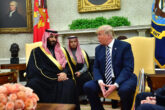November 15, 2019
Trump’s Boasts of an Economic ‘Boom’ Are Misplaced and Misguided
President Donald Trump this week laid out his most direct case yet for staying the course in the run-up to the 2020 U.S. presidential election. In a speech to the Economic Club of New York on Tuesday, he boasted that his “America First” policies had delivered stronger-than-expected economic growth and new jobs for millions of Americans, despite the disruption caused not only by his trade war with China, but also by the tariffs he has imposed on close U.S. allies in Europe.
While most coverage of the speech focused on Trump claiming credit for leading an economic “boom,” it was more revealing in capturing how the president thinks about economic statecraft overall—and how he misconstrues it. Trump misunderstands American economic strength, the leverage it gives him over U.S. partners as well as adversaries, and what the best approach is when the United States feels the rules of the road are not in its favor.
Take energy policy, which Trump promoted in his speech as “pro-growth, pro-worker, and 100 percent pro-American.” But Trump mistakes the relative leverage the U.S. derives from its abundant domestic oil and natural gas production with absolute leverage against all other players in the global market. This is a dangerous assumption, particularly as it comes when the International Energy Agency projects that the U.S. will account for 85 percent of the global increase in oil production between now and 2030, thanks in large part to shale oil and gas resources. That level of market share makes it tempting to overreach when talking about energy independence.
Read the full article in World Politics Review.
More from CNAS
-
Game Over?
The trade wargame suggests that sustained high tariffs could create leverage and urgency to spur action toward a productive restructuring of the international trade system....
By Emily Kilcrease & Geoffrey Gertz
-
Middle East Security / Energy, Economics & Security
Trump Inks $600 Bn Deal In Saudi Arabia | Musk, Blackrock CEO Flank Trump In Gulf VisitIn today's episode of India Global, U.S. President Donald Trump secured a $600 billion commitment from Saudi Arabia on Tuesday to invest in the United States. NDTV's Gaurie Dw...
By Daniel Silverberg
-
Energy, Economics & Security / Technology & National Security
Tariffs and Tech: An Uncertain RecipeHigher tariffs could prompt American cloud companies to shift more of their capital investments abroad....
By Pablo Chavez
-
Trump Tariffs: How Will U.S. Plans Reshape the Global Economy?
Donald Trump says he's already decided the tariffs he will impose on countries that export goods to America, including the United Kingdom. Channel 4 hears from Emily Kilcrease...
By Emily Kilcrease




